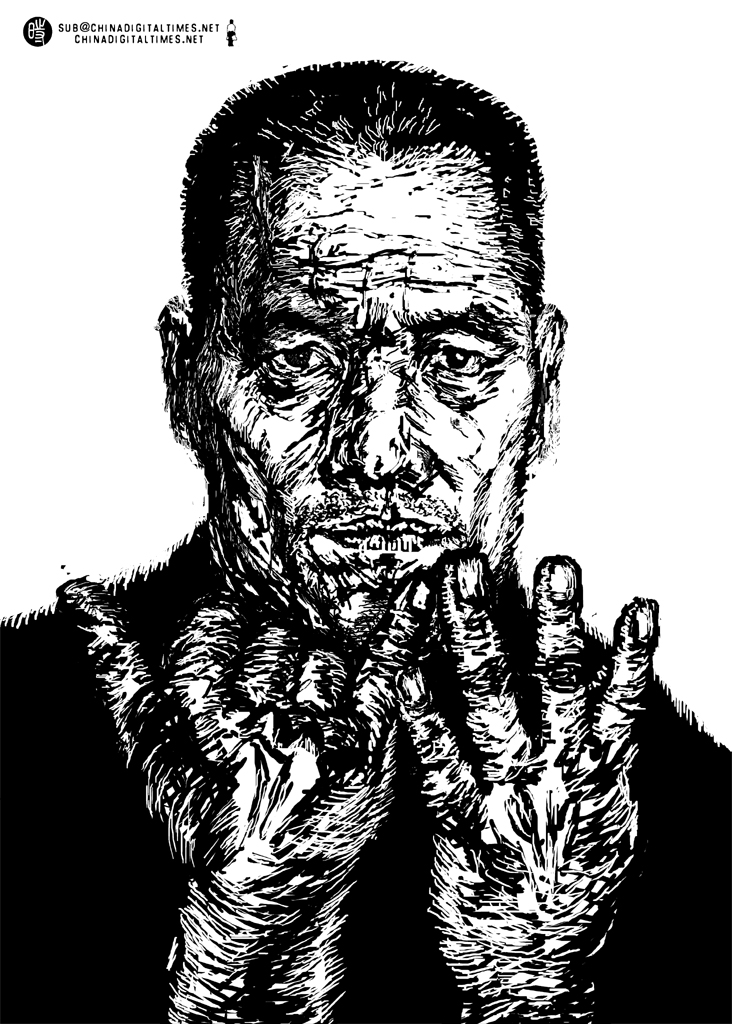Beijing police formally arrested prominent rights lawyer Pu Zhiqiang on Friday, on suspicion of causing disturbance and illegally obtaining personal information. From AP’s Gillian Wong:
The arrest of attorney Pu Zhiqiang, announced by Beijing’s Public Security Bureau on its microblog website, is being seen by activists as part of an effort by Chinese authorities to rein in outspoken lawyers who have harnessed social media and other platforms to raise public awareness about civic rights.
[…] His lawyer, Zhang Sizhi, a veteran rights attorney, confirmed the arrest when reached by phone but declined to provide details on what the charges could involve, saying it was at Pu’s request.
The police bureau said investigations into other alleged crimes were ongoing, an indication that Pu could eventually face more charges. [Source]
The arrest came at the limit of the permitted 37-day period since Pu was placed in criminal detention. He was one of several detained after attending a meeting to commemorate the 25th anniversary of the 1989 June 4th crackdown; the other four were released last week after the sensitive anniversary had passed. They were followed by Vivian Wu, a former South China Morning Post journalist, and Xin Jian, a news assistant for Nikkei, both of whom had connections with Pu. Pu’s aide and niece Qu Zhenhong remains in detention, also under suspicion of illegally obtaining personal information.
The prospect of further charges appears to confirm fears expressed by Pu’s lawyer earlier this week. Zhang Sizhi was unexpectedly able to see Pu on Monday, and relayed reports of 10-hour interrogation sessions and deteriorating health. From Tom Phillips at The Telegraph:
Mr Zhang said Mr Pu feared for his professional future and described his outlook as “terrifying”. Speculation that the rights lawyer would be released within days was “a joke,” Mr Zhang wrote. Claims he would receive a maximum sentence of three years in prison was a “daydream”.
William Nee, China Researcher at Amnesty International, said many observers believed Beijing was pursuing Mr Pu precisely because he was a moderate voice rather than a “true radical”.
“If they want to silence the human rights legal community it is more effective to pick someone who is more moderate in tone since it sends a message to everyone,” he said.
[…] “It’s disappointing that the government doesn’t see him as an ally in trying to promote genuine social stability. Instead they are mostly likely going to be arresting him on trumped up charges,” Mr Nee said. [Source]
[Update: Zhang’s notes from his meeting with Pu have been translated by ChinaFile.]
Moderate though Pu may be, he has been a persistent challenger. In the past year, he has been involved in cases including those of Tang Hui, who was sent to a labor camp after petitioning for the execution of people who kidnapped and raped her 11-year-old daughter and forced her into prostitution; the family of Yu Qiyi, a state-owned enterprise employee who was tortured to death in detention; and members of the New Citizens’ Movement, a campaign for transparency and civil rights which was systematically dismantled earlier this year. Read more on Pu via CDT, and in a 2004 profile by Philip Pan at The Washington Post (via Joshua Rosenzweig).
Last month, Chang Ping reported disagreement over whether supporters should fiercely oppose activists’ prosecutions, at possible risk of antagonizing the authorities. As an example, he cited Pu’s own aggressive defense of Sichuan earthquake victims’ advocate Tan Zuoren. On Monday, Siweiluozi translated an essay by legal scholar Zhang Xuezhong, who argued that in Pu’s case, there is no longer anything to be lost by a “determined and resolute defense”:
As to the substantive issues in the case, Lawyer Pu merely attended a seminar in a private residence and Beijing police placed him under criminal detention for creating a serious disturbance. This kind of charge is clearly preposterous. With respect to procedure, the Beijing police have flagrantly deprived Pu’s defense lawyer of his right to meed with his client [read more at China Media Project]. Clearly, Pu’s detention and the charges against him are legal persecution from beginning to end. At this point, if we continue with a restrained defense strategy, the authorities will be happy to see this persecution through to the end. But if a defense lawyer were to expose the authorities’ persecution publicly and attract the broader attention of public opinion, the authorities might pull back a bit. […]
In reality, the case against Pu Zhiqiang has from the beginning been retaliation for all of Pu’s previous actions in the public interest. What his family and defense lawyers most need to consider now, therefore, is how to prevent the authorities from retaliating against Pu and not worrying whether a strong defense might lead the authorities to retaliate. This is because the authorities’ decision whether or not to punish Pu will be primarily based on what Pu has done prior to being detained, not on what Pu’s defense lawyer does after Pu was arrested. [Source]








